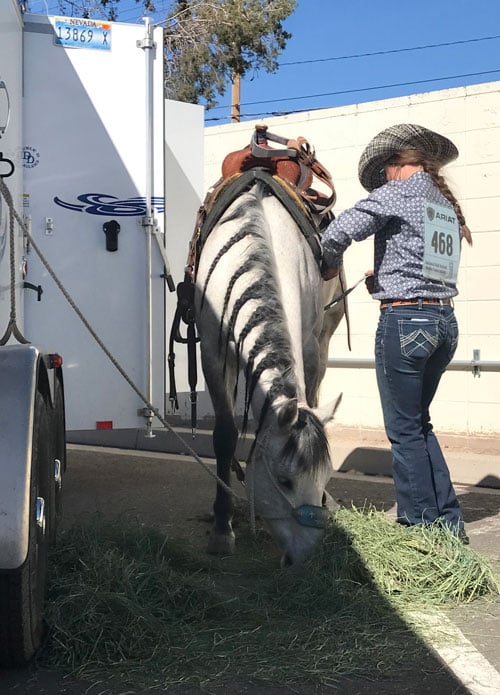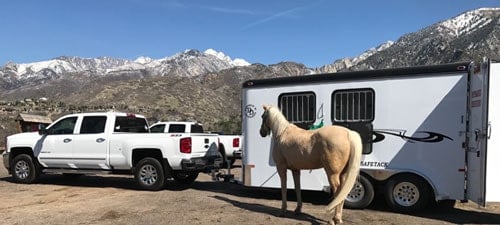Important Laws and Rules to Know Before You Tow a Horse Trailer
Staying legal on the road is important to consider before you hitch up your trailer. Laws are usually put into place for a good reason, so checking your local towing laws can be a great way to keep your horses and family safe.
In this article, we’d like to provide a basic primer for some of the laws you may encounter. We recommend you check with your local DMV for specifics on your home state.
Do you have the correct type of driver’s license to tow a trailer?
This first question is likely the most important. Once you’ve legally earned your regular driver’s license, there may be some additional hoops to jump through before you can tow your trailer.
Whether or not you need a special license largely depends on why you are hauling your trailer and the weight of your entire rig.
The Federal Motor Carrier Safety Administration (FMCSA) puts special restrictions on people who are hauling horses for business purposes. This would include professional racing operations, horse transportation companies, and possibly horse boarding/training operations. (The sources are a bit unclear on this last one.)
But for most of us – simply hauling our horse to a show or out for a trail ride – we don’t need to worry about this restriction. Even if your show offers scholarship or prize money, this is still considered a “non-business” event and you will not need special licenses for business hauling.
Next, your type of license is going to depend on the weight capacity of your truck and trailer, also called the GVWR (Gross Vehicle Weight Restriction). If your GVWR is greater than 10,001 lbs, there is a chance you may need a commercial driver’s license (CDL), electronic logging device (ELD) or paper record of duty status (RODS.)
Phew… that’s a lot of acronyms! Let’s try to break this down so it makes sense…
 An ELD device logs driving time and syncs with your engine. It keeps track of routes taken, vehicle speed and mandatory rest periods according to a pamphlet from the American Horse Council.
An ELD device logs driving time and syncs with your engine. It keeps track of routes taken, vehicle speed and mandatory rest periods according to a pamphlet from the American Horse Council.
A CDL is a commercial driver’s license that requires additional training and test for certification. It’s the same type of license commercial truckers have. You may need this if your rig exceeds 26,000 pounds.
First off, don’t panic. If you have a small bumper pull horse trailer (less than 10,001 lbs)… chances are you’re fine. If you have a larger gooseneck horse trailer or horse trailer with living quarters, pay attention.
If you have a trailer with a GVWR of over 10,001 lbs you may need an ELD to complete the RODS. In this case, a CDL is NOT required.
If you have a trailer with a GVWR of over 26,001 lbs, you may need an ELD to complete the RODS. And here, a CDL MAY be required.
To know for sure if you need a commercial driver’s license for your state, do this:
- Find the GVWR of your truck and trailer.
- Check the specific license requirements for your home state.
- Review the Federal Motor Carrier Safety Administration’s requirements.
If you are transporting your horse on an interstate highway in a vehicle with a GVWR of more than 10,000 pounds (but less than 26,001 lbs), then you do not need to have a commercial driver’s license.
Does your trailer and tow vehicle need special inspections?
Again, this varies state by state, but the majority of states require an annual inspection of some sort for license renewal. If you’re lucky, your state may offer a “permanent plate” so the annual inspection isn’t required. This is the case in North Carolina and many other states.
Again, check with your home state to be sure you follow the correct rules.
Are there special speed rules for driving a horse trailer?
The short answer is “no.” Follow the posted speed limit whenever you are driving.
However, you should also use some common sense. If you are in a much larger and heavier vehicle (like while you are towing your trailer), it is going to take much longer for your vehicle to brake in the case of an emergency. If you add wet roads to the equation, stops take even longer.
Be sure to use a safe following distance (longer than you would in just your car) so you have enough room to stop your rig if needed. Double this distance if the roads are wet. You will also need extra time to accelerate on an on-ramp or at an intersection.
 Are there special rules about going through tunnels or over mountains?
Are there special rules about going through tunnels or over mountains?
To answer this question, you should know some basics about your trailers size and weight. You don’t want to go through a tunnel or under an overpass if your trailer is too tall. That would spell disaster.
If you know your trip is taking you over a mountain or over rough terrain, have a plan in mind before you reach the descent. Your brakes need to be in good working order, so check them carefully.
Do you need to stop at inspection or weigh stations?
As for weigh stations, follow the posted signs in your home state. If your rig is over 10,001 lbs or 26,001 lbs you may need to stop at one of these weigh stations. Often, these facilities are backed up with semi-trucks and you may be told to move along without weighing. Again, check your home state.
In Maryland, for example, all vehicle combinations over 10,000 lbs are required to stop at all weigh stations. In addition, horse trailers need to stop at all agricultural inspection stations even if the trailer is empty or hauling non-agricultural cargo.
What other rules should you follow when towing a horse trailer?
In general, you should practice caution when hauling your horse trailer. Here are a few basic tips that will help you:
- Check that your tow vehicle, hitch, and trailer are well-matched and in good working order.
- Practice driving your trailer without your horse on board so you can get used to the feel.
- Use smart loading practices with the heaviest horses on the left side of the trailer or towards the front of a slant load horse trailer.
- Pack all safety gear for you, your horse, and your vehicle.
- Make sure you can see well and be seen when driving your trailer. Check mirrors and lights.
- Allow extra stopping distance, extra time for acceleration, and make wide turns.
- Know how to deal with trailer sway.
- Drive so your horses can adjust their balance around turns or changes in speed.
- Be alert for odd shakes and sounds – your horse may be in distress.
- Be sure the interior of your trailer is comfortable for your horse – check temperature, water, hay, or sharp areas they could cut themselves on.
The best thing you can do is be well prepared. Learn about your trailer and truck’s GVWR and then check with your home state to make sure you are hauling legally and safely. If you have any questions, we'll do our best to help. Just contact us here.

 Are there special rules about going through tunnels or over mountains?
Are there special rules about going through tunnels or over mountains?